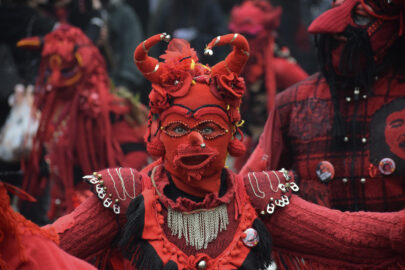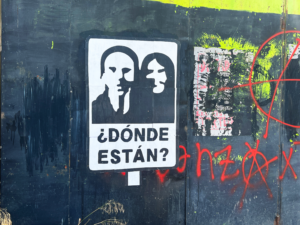Chile: Leftist Administration Hit Hard By Latest Constitutional Vote
The extreme right takes 22 out of 50 seats on a committee to rewrite the constitution. José Antonio Kast in Santiago, Chile, May 7, 2023. AP Photo / Esteban Felix
This is Part of the "Chile’s Utopia Has Been Postponed" Dig series
José Antonio Kast in Santiago, Chile, May 7, 2023. AP Photo / Esteban Felix
This is Part of the "Chile’s Utopia Has Been Postponed" Dig series
Chile’s Progressive President Gabriel Boric and his leftist administration suffered a major blow this weekend when the extreme-right Republican Party of José Antonio Kast, along with other right-wing allies, won an overwhelming 2-to-1 majority on a committee elected to begin rewriting the country’s 1980 constitution imposed by the Augusto Pinochet dictatorship. The vote reveals significant dissatisfaction on the left concerning Boric’s recent moves toward the center.
The coalition backing the mostly millennial Boric government (he’s 37) won just a one-third of the national vote. José Kast — an admirer of former dictator Pinochet and a supporter of Brazilian strongman Bolsonaro — won the largest plurality with nearly 40 percent. An array of smaller conservative and center-right parties won about 25 percent of the seats, giving the combined right-wing total domination of the committee. As many as 20 percent of the ballots were defaced or left blank.
Expert sources inside Chile attribute the high rate of nulos — blanks — to a silent protest by the left. Many of Boric’s leftist supporters have been ruffled by his recent moves to placate the conservative opposition, especially around the issues of public security and policing.
The current Pinochet-era constitution has been rejected by broad swaths of the population as too narrow and undemocratic. After a general peaceful uprising in 2019, more than 80 percent of Chileans voted to rewrite it. During the two-year-long process, elongated and interrupted by the pandemic, former leftist student leader Boric won the presidency with 55 percent of the vote against Kast, whose father was reportedly a Nazi. Boric took office in March 2022.
When the first draft constitution was put up for approval in a plebiscite in September, the government invested its capital in the charter, which it believed would open the doors to broad social reform. But the ravages of the pandemic, a depressed economy, a spike in crime, and too many radical and unusual proposals led to a deafening defeat nearly identical to Sunday’s vote.
The Chilean political class retreated, huddled and came up with a new process to rewrite the constitution, one more conservative that is controlled more by the congress, rather than by the executive. The first step took place Sunday with the election to establish the primary committee in charge of writing the new constitution. The draft will go through two other unelected bodies for modifications, with the final text put to a plebiscite in December.
Expert sources inside Chile attribute the high rate of nulos — blanks — to a silent protest by the left.
Some political analysts are now predicting, or at least suggesting, that eventual approval might be blocked by Boric supporters who dislike the final product. Analyst Roberto Funk of the University of Chile opines that the new constitution is destined to be substantially conservative, the opposite of what Boric promised when elected last year.
“Right now, it looks like we are going to have, in the best-case scenario, very few changes to what we already have now and, in the worst-case scenario, actually a shift to the right,” Funk told The Guardian. “The Republicans could try to prohibit abortion in the constitution, for example. So we could actually end up with a constitution which on values issues is even more conservative than what we have now. That’s what worries me more than anything else because that just means a continuation of uncertainty and tension and polarization.”
Sunday’s vote, which gave the Chilean Right momentum and forced the Boric administration onto its back foot, surprised many of the administration’s supporters. While some thought the Right might win, virtually nobody on the Left predicted such a lopsided outcome.
Since Boric’s stinging defeat in the September plebiscite, he has increased the cabinet presence and power of more veteran, moderate center-leftists, including those he once criticized. A recent spate of police officers killed in action, meanwhile, has led to the passage of pro-police measures in the opposition-led congress, irritating many of the president’s supporters who call the new legislation “trigger-happy.” The issue strikes a nerve for the Chilean left, as the police forces were never reformed after the end of the Pinochet dictatorship 30 years ago. The institution maintains a treacherous and violent reputation and is well-known for withholding important investigative material.
Sunday’s vote, which gave the Chilean Right momentum and forced the Boric administration onto its back foot, surprised many of the administration’s supporters.
Last month, Congress delivered another body blow to Boric when it narrowly voted down his proposal for much-needed and popular tax reform in a country where tax evasion is epidemic. Boric has argued that without better tax collection, especially from the wealthy, the government will not be able to finance proposed social reforms to combat Chile’s egregious economic inequality. Reports say talks over tax policy will begin next week under initiative from the president, but he will clearly be negotiating from a weakened position.
The Boric government still has three years until the next election, and declaring it dead would be a serious misreading of Chilean politics.
Much of the left is now considering some sort of political counter-offensive to thwart the renewed push of the right. The more moderate Right (which is not very moderate at all) is under pressure from extremist Kast.
Until recently, Kast had been the junior, rowdy partner within the right-wing universe. That universe is now the dominant force on the right, reducing traditional right-wing parties that had flourished under the dictatorship to the back benches. Kast’s strategy will be to do everything possible to remain as undisputed leader of the right and emerge its chosen presidential candidate in three years.
Ironically, this outcome might be the best hope for re-election of a progressive government. The rise of Kast — often called Chile’s Trump — has produced a sharp polarization and negative partisanship in the Chilean political world. Indeed, many analysts attribute Boric’s 55 percent landslide victory over Kast in 2022 to the latter’s deep unpopularity. Vast sectors of Chilean society, regardless of their view of Boric, have little appetite for a return to a pro-Pinochet regime.
Ironically, this outcome might be the best hope for re-election of a progressive government. The rise of Kast — often called Chile’s Trump — has produced a sharp polarization and negative partisanship in the Chilean political world.
That the Boric forces will now do everything possible to drive a wedge between Kast and the more traditional right wing as a primary political strategy is evident. Just hours after Sunday’s surprise vote was announced, the government’s official spokesperson, Camila Vallejo of the Chilean Communist Party, began courting the more moderate right, led by Evelyn Matthei, the daughter of a deceased member of the Pinochet ruling junta. “There is a Chilean Right that has shown a greater democratic disposition and after yesterday’s results,” Vallejo said, clearly referring to the conservatives led by Matthei, “that democratic orientation should not change.”
Not all her comrades share that positive view. Communist Sen. Daniel Nuñez said, “There’s an obvious risk that [the more moderate right] becomes that caboose of [Kast’s] Republican Party and takes a harder line.”
Meanwhile, Boric managed to score a few points with his constituents last week when he announced Chile is nationalizing its lithium reserves, the second-largest in the world, creating a possible long-term financial windfall for the Chilean state. A government-supported measure was enacted last month that cuts the Chilean workweek to 40 hours.
Not to be overlooked, Boric has announced that his government will be the first in Chilean history to investigate the circumstances of the nearly 1,500 victims of the Pinochet dictatorship whose remains have never been found or identified.
“We have a moral duty to never stop looking,” Boric said as he introduced his National Search Plan.
Your support matters…Independent journalism is under threat and overshadowed by heavily funded mainstream media.
You can help level the playing field. Become a member.
Your tax-deductible contribution keeps us digging beneath the headlines to give you thought-provoking, investigative reporting and analysis that unearths what's really happening- without compromise.
Give today to support our courageous, independent journalists.









You need to be a supporter to comment.
There are currently no responses to this article.
Be the first to respond.